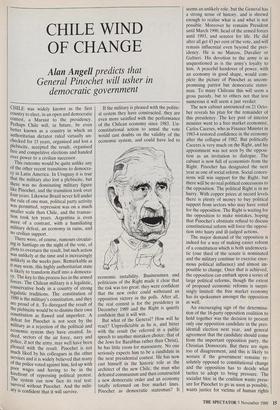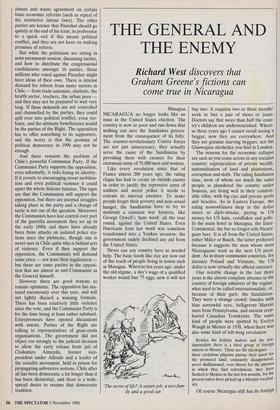CHILE WIND OF CHANGE
Alan Angell predicts that
General Pinochet will usher in democratic government
CHILE was widely known as the first country to elect, in an open and democratic contest, a Marxist to the presidency. Perhaps Chile will, in future, be even better known as a country in which an authoritarian dictator ruled virtually un- checked for 15 years, organised and lost a plebiscite, accepted the result, organised free and competitive elections and handed over power to a civilian successor.
This outcome would be quite unlike any of the other recent transitions to democra- cy in Latin America. In Uruguay it is true that the military also lost a plebiscite, but there was no dominating military figure like Pinochet, and the transition took over four years. Likewise Brazil never fell under the rule of one man, political party activity was permitted, repression was on a much smaller scale than Chile, and the transac- tion took ten years. Argentina is even more of a contrast, with a humiliating ' military defeat, an economy in ruins, and no civilian support. There were, of course, rumours circulat- ing in Santiago on the night of the vote, of plots to overturn the result, but such action was unlikely at the time and is increasingly unlikely as the weeks pass. Remarkable as it may seem, this highly authoritarian state is likely to transform itself into a democra- cy. The key to this process lies in the armed forces. The Chilean military is a legalistic, Conservative body in a country of strong legalistic traditions. The constitution of 1980 is the military's constitution, and they are proud of it. To disregard the result of the plebiscite would be to dismiss their own constitution as flawed and imperfect. A defeat for Pinochet is not seen by the military as a rejection of the political and economic system they have created. In- deed, sectors of the air force, navy and police, if not the army, may well have been pleased with the result. Pinochet is not much liked by his colleagues in the other services and it is widely believed that many of the police voted against him, fed up with poor wages and having to he in the forefront of repressing political protest. The system can now face its real test: survival without Pinochet. And the milit- ary is confident that it will survive. If the military is pleased with the politic- al system they have constructed, they are even more satisfied with the performance of the Chilean economy since 1983. Un- constitutional action to annul the vote would cast doubts on the validity of the economic system, and could have led to economic instability. Businessmen and politicians of the Right made it clear that the risk was too great: they were confident that the new order could withstand an opposition victory in the polls. After all, the real contest is for the presidency in December 1989 and the Right is quietly confident that it will win. But what of the General? How will he react? Unpredictable as he is, and bitter with the result (he referred in a public speech to another mistaken choice: that of the Jews for Barabbas rather than Christ), he has little room for manoeuvre. No one seriously expects him to be a candidate in the next presidential contest. He has now cast himself in the historic role as the architect of the new Chile, the man who defeated communism and then constructed a new democratic order and an economy totally reformed on free market lines. Pinochet as democratic statesman? It seems an unlikely role, but the General has a strong sense of history, and is shrewd enough to realise what is and what is not possible. Moreover he remains President until March 1990, head of the armed forces until 1993, and senator for life. He did after all get 43 per cent of the vote, and will remain influential even beyond the pres- idency. He is no Marcos, Duvalier or Galtieri. His devotion to the army is as unquestioned as is the army's loyalty to him. A peaceful handover of power, with an economy in good shape, would com- plete the picture of Pinochet as uncom- promising patriot but democratic states- man. To many Chileans this will seem a gross parody, but to others not that less• numerous it will seem a just verdict, The new cabinet announced on 21 Octo- ber reveals his plan for the remainder of this presidency. The key post of interior minister went to a free market economist, Carlos Caceres, who as Finance Minister in 1983-4 restored confidence in the economy after the collapse of 1982. But politically Caceres is very much on the Right, and his appointment was not seen by the opposi- tion as an invitation to dialogue. The cabinet is now full of economists from the Right. Pinochet has designated the next year as one of social reform. Social conces- sions will win support for the Right, but there will be no real political concessions to the opposition. The political Right is in no hurry. With copper prices at record levels there is plenty of money to buy political support from sectors who may have voted for the opposition. The Right is waiting for the opposition to make mistakes, hoping that Pinochet's obstinate refusal to discuss constitutional reform will force the opposi- tion into hasty and ill-judged actions.
The major demand of the opposition is indeed for a way of making easier reform of a constitution which is both undemocra- tic (one third of the senate is nominated and the military continue to exercise enor- mous political influence) and almost im- possible to change. Once that is achieved, the opposition can embark upon a series of large political reforms, though the extent of proposed economic reforms is surpri- singly limited: the free market economy has its spokesmen amongst the opposition as well.
An encouraging sign of the determina- tion of the 16-party opposition coalition to hold together was the decision to present only one opposition candidate in the pres- identidl election next year, and general agreement that the candidate should come from the important opposition party, the Christian Democrats. But there are signs too of disagreement, and this is likely to worsen if the government remains re- solutely opposed to constitutional change and the opposition has to decide what tactics to adopt to bring pressure. The socialist bloc in the coalition wants press- ure for Pinochet to go as soon as possible, justice ustice for victims of human rights abuses and wants agreement on certain basic economic reforms (such as repeal of the restrictive labour laws). The other parties are keener that Pinochet should go quietly at the end of his term, in preference to a quick exit if this means political conflict, and they are not keen on making promises of reform.
But while the politicians are sitting in semi-permanent session, discussing tactics, and how to distribute the congressional candidatures amongst 16 parties, those millions who voted against Pinochet might have ideas of their own. There is intense demand for reform from many sectors in Chile — from trade unionists, students, the health sector, teachers, the urban poor and they may not be prepared to wait very long. If these demands are not controlled and channelled by the parties, they could spill over into political conflict, even vio- lence, and the ultimate beneficiaries would be the parties of the Right. The opposition has to offer something to its supporters, and the worry is that the promise of ' political democracy in 1990 may not be enough.
And there remains the problem of Chile's powerful Communist Party. If the Communist Party supports the opposition, even informally, it risks losing its identity. If it reverts to encouraging street mobilisa- tion and even political violence it could upset the whole delicate balance. The signs are that the Communists will support the opposition, but there are internal struggles taking place in the party and a change of tactic is not out of the question. Moreover the Communists have lost control over part of the guerrilla movement they set up in the early 1980s and there have already been three attacks on isolated police sta- tions since the plebiscite, though one is never sure in Chile quite who is behind acts of violence. Even if they support the opposition, the Communists will demand some price — not least their legalisation but there are some parties in the opposi- tion that are almost as anti-Communist as the General himself.
However there are good reasons to remain optimistic. The opposition has ma- tured enormously over this year, and will not lightly discard a winning formula. There has been relatively little violence since the vote, and the Communist Party is for the time being at least rather subdued. Entrepreneurs have opened discussions with unions. Parties of the Right are talking to representatives of grass-roots organisations. The government did not object too strongly to the judicial decision to allow the early release from jail of Clodomiro Almeyda, former vice- president under Allende and a leader of the socialist movement, held in prison for propagating subversive notions. Chile after all has been democratic a lot longer than it has been dictatorial, and there is a wide- spread desire to resume that democratic tradition.



































































 Previous page
Previous page